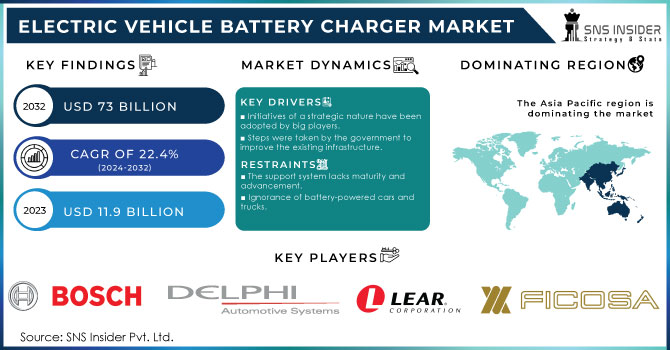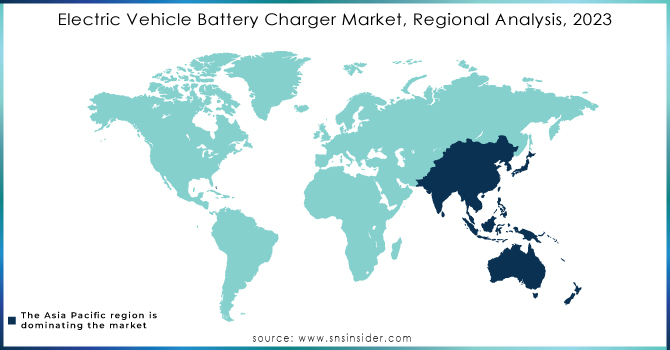Electric Vehicle Battery Charger Market Report Scope & Overview:
The Electric Vehicle Battery Charger Market Size was valued at USD 11.9 billion in 2023 and is expected to reach USD 73 billion by 2032 and grow at a CAGR of 22.4% over the forecast period 2024-2032.

Get More Information on Electric Vehicle Battery Charger Market - Request Free Sample Report
A battery charger for electric vehicles is a device that transmits electricity from the power grid and distributes it to charge electric vehicles such as battery electric vehicles and plug-in hybrid electric vehicles. The electric car battery charger industry has developed and manufactured a wide range of AC to DC converters and battery chargers. Battery charger manufacturers are working to improve battery charging efficiency and convert alternating current to direct current. These businesses are putting an increased emphasis on the production and development of various types of automotive battery chargers. The global market has become reliant on electric vehicles as a result of their widespread acceptance.
In addition, battery charger manufacturers are working to improve the charging procedure for electric vehicles. When the battery reaches a full charge, the charging process is automatically stopped. Companies are creating automatic electric battery chargers and more advanced portable battery chargers in order to meet these needs. In order to avoid battery overheating and excessive charging, these sophisticated functions are useful.
In October of 2021, Tesla introduced and installed its first Mega-charger in order to facilitate the charging of its all-electric semi.
Electric Vehicle Battery Charger Market Dynamics:
KEY DRIVERS:
-
Initiatives of a strategic nature have been adopted by big players.
-
Steps were taken by the government to improve the existing infrastructure.
-
The market penetration of the electric vehicle.
-
The continuously increasing demand for electric automobiles.
RESTRAINTS:
-
The support system lacks maturity and advancement.
-
Ignorance of battery-powered cars and trucks.
-
The high price of electric cars and the fear of their limited range are significant issues.
OPPORTUNITIES:
-
Fast charging batteries have created opportunities for manufacturers & stakeholders.
-
Government efforts to create electric vehicles and improve battery chargers.
CHALLENGES:
-
Increased financial outlay for the creation of charging stations.
-
Due to the greater cost of electric vehicles.
-
Owing to the severe guidelines and regulations imposed by the government.
IMPACT OF COVID-19:
Electric Vehicle Battery Charger Industry expansion for the year 2020 has been hampered as a result of the ongoing global epidemic caused by COVID-19. The worldwide market's supply chain has been thrown off during this epidemic time, which has caused widespread disruption. The financial sector of the global market has been affected as a result of this. According to the analysis on the worldwide market, the top players' unwavering commitment to the global market has resulted in increased success in the current year. In addition to this, it has made it a priority to increase its market share during the term that is being anticipated.
Electric Vehicle Battery Charger Market Segmentation Overview
By Charging Level:
Based on the charging level segment, the global market has been divided into level 1, level 2, and level 3. These three separate charge levels each have unique characteristics and functionalities that can contribute to the expansion of the market and the generation of a sizeable portion of that market within the period covered by the research.
By Electric Vehicle Type:
The global market has been divided into BEV, HEV, and PHEV based on the electric vehicle type segment. These two distinct types of electric vehicles each have distinctive characteristics and attributes that are expected to drive growth in the size of the market for electric car battery chargers throughout the course of the forthcoming era.
By Application:
The global market has been divided into public, and private based on the application. The development of these two applications will have a significant impact on the growth of the market for electric car battery chargers.
Electric Vehicle Battery Charger Market Regional Analysis:
The global market for electric car battery chargers has been segmented into several key regions, including the Asia-Pacific region, North America, Europe, and others. During the time period covered by the research, it is anticipated that the market in the Asia-Pacific region will hold the largest share of the market. Because of the region's severe government laws, the expanding number of government programmes, and the reasonable pricing of electric charging stations and electric vehicles, this region's growth is being fueled by these factors. In addition, the growth of the Asia-Pacific market has been noticed due to the fact that China, the region's largest market, has established ambitious goals for the development of electric vehicles in the upcoming years. In addition, China has the ambitious goal of having around 5 million electric vehicles operating on the roads by the end of the year 2020. It is anticipated that this kind of expansion will give rise to attractive chances for the global industry during the time under consideration.

Get Customized Report as per Your Business Requirement - Request For Customized Report
KEY PLAYERS:
Delphi Automotive LLP (Ireland), Robert Bosch GmbH (Germany), Current Ways Inc. (US), IES Synergy (France), Clore Automotive LLC (US), Lear Corporation (US), Baccus Global LLC (US), Tesla (US), Meta Systems S.P.A (Italy), LG Electronics (South Korea), Ficosa International SA (Spain), CTEK Holding AB (Sweden) and Schumacher Electric Corporation (US) are some of the affluent competitors with significant market share in the Electric Vehicle Battery Charger Market.
| Report Attributes | Details |
| Market Size in 2023 | US$ 11.9 Billion |
| Market Size by 2032 | US$ 73 Billion |
| CAGR | CAGR of 22.4% From 2024 to 2032 |
| Base Year | 2023 |
| Forecast Period | 2024-2032 |
| Historical Data | 2020-2022 |
| Report Scope & Coverage | Market Size, Segments Analysis, Competitive Landscape, Regional Analysis, DROC & SWOT Analysis, Forecast Outlook |
| Key Segments | • by Charging Level (Level 1, Level 2, Level 3) • by Electric Vehicle Type (BEV, HEV, PHEV) • by Application (Private, Public) |
| Regional Analysis/Coverage | North America (US, Canada, Mexico), Europe (Eastern Europe [Poland, Romania, Hungary, Turkey, Rest of Eastern Europe] Western Europe] Germany, France, UK, Italy, Spain, Netherlands, Switzerland, Austria, Rest of Western Europe]), Asia Pacific (China, India, Japan, South Korea, Vietnam, Singapore, Australia, Rest of Asia Pacific), Middle East & Africa (Middle East [UAE, Egypt, Saudi Arabia, Qatar, Rest of Middle East], Africa [Nigeria, South Africa, Rest of Africa], Latin America (Brazil, Argentina, Colombia, Rest of Latin America) |
| Company Profiles | Delphi Automotive LLP (Ireland), Robert Bosch GmbH (Germany), Current Ways Inc. (US), IES Synergy (France), Clore Automotive LLC (US), Lear Corporation (US), Baccus Global LLC (US), Tesla (US), Meta Systems S.P.A (Italy), LG Electronics (South Korea), Ficosa International SA (Spain), CTEK Holding AB (Sweden) and Schumacher Electric Corporation (US) |
| Key Drivers | •Initiatives of a strategic nature have been adopted by big players. •Steps were taken by the government to improve the existing infrastructure. |
| RESTRAINTS | •Initiatives of a strategic nature have been adopted by big players. •Steps were taken by the government to improve the existing infrastructure. |

